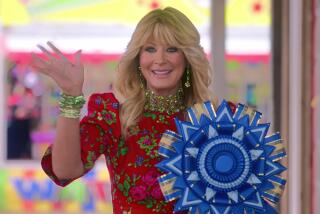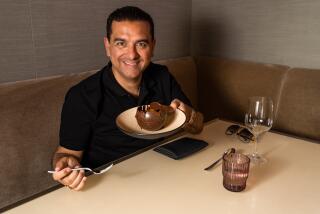WORLD REPORT PROFILE : Rik de Baere : Belgium’s duke of dessert is entertaining highflying offers after winning pastry-making’s World Cup.
- Share via
BRUSSELS — He’s the prince of chocolate, the duke of dessert, the king of calories--a hero to any and all who reject rabbit food and low-fat diets.
He’s a talented 30-year-old Brussels patissier named Rik de Baere, whose dazzling culinary skills enabled him and two teammates to walk off last month with the World Cup in pastry-making!
His Belgian team won the hotly contested title with a trio of creations that would drive any self-respecting sweet tooth crazy. Think about it: a bitter chocolate mousse layer cake with caramel orange-cream filling; a combination cocoa, chocolate and red fruit-puree ice cream; and an assortment of apple vanilla, white cheese and caramel individual pastries.
Collectively, the result was good enough to edge out teams from Japan, the United States and 17 other nations for the world title and a cash prize of $10,800.
In Belgium, a country recognized as one of the world’s premier nations for good eating and whose kitchens have a way of turning out French quality with German portions, De Baere has become an instant celebrity.
Media interviews, TV talk shows, command performances and photo ops have entered his life.
To be sure, creations such as his orange butter-cream on a triangular chocolate cookie (called a “Twenty”), or his bitter (70% cocoa) chocolate roll filled with a vanilla mousse (known as “the Marjari”), have long been applauded by locals who know his work.
On the day of the cup final, they even staged their own victory celebration.
“When the results came over the radio, I was told there was a kind of explosion in the shop,” he said. “People really got excited. They all wanted to sample what won for us.”
Now others outside do too.
Aspiring Japanese patissiers have expressed interest in studying under De Baere, and he is now in talks with American and Singapore Airlines to supply their first-class services with his gold medal creations.
“It’s an honor we’d like to have,” he said during a recent interview in the living room of his modest apartment two floors above his now-famous corner shop in the Brussels suburb of Woluwe-St. Lambert.
While the title has brought fame, it has also brought new pressures.
“There’s more stress in the shop,” he admitted. “My customers expect a lot now, but basically we’re just a pastry shop, doing the best we can. We try to go out each day and produce world championship quality.”
Just what makes a world-class pastry maker is hard to say, according to the champ, although hard work, the courage to experiment and some inborn talent are certainly among the prerequisites.
“You’re either artistic or not,” he said. “You have to have something special with your hands, then you have to practice.”
Sugar, he noted, must be cooked to 170 degrees Celsius (about 340 Fahrenheit), then poured and worked under a hot lamp that keeps it about 60C (140F). Chocolate is shaped at a cooler temperature, around 32C (90 F).
While the potential shapes and contents of pastry are virtually infinite, De Baere said his secret is simplicity.
“People tend to look for too many combinations,” he said. “Keep it easy, keep it light. That’s the answer.”
One example: An earlier award-winner De Baere dubbed Irish Coffee is a stack of several round, 1/8-inch-thick layers of chocolate mousse and creme brulee all sitting on a crispy chocolate disk.
The texture and taste of his creations are as much expressive pieces of art as they are something to savor with afternoon coffee--a ritual known in Belgium as a gouter .
De Baere’s road to the top began at age 14. He found part-time work washing dishes at a bakery in his home town of Maldegem, near the picturesque city of Brugge before quitting school two years later to join the staff of a bakery in Brussels.
Fascinated by the creative dimension of pastry making, he eventually enrolled in the Ter Groene Poorten catering school in Brugge to master the tools of the trade.
“For some people it was about learning a routine but, for me, it became a search for perfection,” he said.
Working six days a week at a Brussels patisserie , he spent evenings and his only day off in the family garage experimenting with new ways to mold and shape the essential ingredients of a good pastry--sugar, chocolate and marzipan.
“My mother used to complain that it was all a waste of time and that I should concentrate on earning a proper income,” De Baere recalled. “She used to ask, ‘Why are you doing all this sugar work? You’ll never make any money making this stupid sugar.’ ”
Occasionally, even mothers can be wrong.
One holiday season, he turned out a series of little sugar Santa Clauses, sold them to local restaurants for cake decorations, then used the profit to buy more materials and better equipment for new experiments.
At the age of 21, De Baere screwed up his courage and entered his first major competition, a two-stage affair in Paris that required the presentation of a finished piece and the preparation of a second one on the spot.
*
The experience could hardly have been worse. For starters, French customs officials forced him to unpack his prepared entry--an elaborate glazed sugar creation--then let it sit in the rain so it lost its glossy texture. After that, the young artist got so hopelessly lost in Paris traffic that he arrived late, losing two hours to his competitors in preparing his second entry.
A look at what top-level professionals turned out was also a shock.
“You see the level of your work, then compare it with the winners, and you think you’ll never get there,” De Baere recalled thinking at the time.
“It was all a bit of a disaster,” summed up his wife, Anne, herself the daughter of a pastry maker, who today runs the business side of the De Baere shop.
It was two years later that de Baere first hit the money, claiming a silver medal against 60 competitors in an international ice cream competition, with a chocolate and caramel combination.
His talents won him new jobs in Brussels, first with the up-market Mahieu confectioner, then with Paul Wittamer, acknowledged as one of Europe’s finest chocolatiers and pastry makers.
Both were challenging, but Wittamer especially proved a tough taskmaster.
“If he didn’t like what you did, he threw it on the floor and you started again,” De Baere said.
In 1990, when Wittamer believed that his student was too inexperienced for the Belgian national competition, De Baere prepared his gateau and ice cream combination entry at home, secretly, showing the master only at the last minute. The result: another silver medal.
Two years later, he was a World Cup silver medalist and then, last month, he helped win the gold for Belgium, along with a friend, Pierre Marcolini, and Gunther van Essche, the head of a sugar design school.
De Baere claims that his victories will not influence his style of work.
“I’m not going to change anything,” he stressed. “I’m committed to making good quality, and we’ll continue that.”
But he does say one thing will be different.
“Now I’m going to listen to my mother,” he said. “I’ll pay more attention to the business side of life.”
Biography
Title: Owner of De Baere pastry shop
Age: 30
Personal: Married with no children. Washed dishes at bakery in Maldegem, Belgium, at age 14, then joined bakery staff in Brussels. Graduate of Ter Groene Poorten catering school in Brugge, Belgium.
More to Read
Eat your way across L.A.
Get our weekly Tasting Notes newsletter for reviews, news and more.
You may occasionally receive promotional content from the Los Angeles Times.










